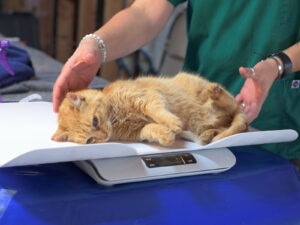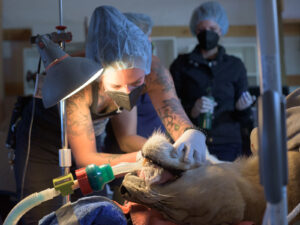Suspecting an Illness: How We Tell if a Cat is Sick
The Keeper Journal

Routine weight calculation on Milo
If you've ever been the parent to a sick animal, you know just how stressful it can be. As much as we would love it, no animal can just come up to us and say, "I don't feel good."
So instead of being able to ask, "Where does it hurt?" we, as animal keepers, need to be expert at pinpointing even the smallest abnormality in the behaviors of our cats to catch an illness before it turns into a severe concern.
Lethargy
One key abnormality we look for is lethargy. Now, you might be thinking, "Cats sleep all the time, don't they? How can you tell if they're lethargic or just taking a normal cat nap?"
Great question.
A lethargic cat, while they do sleep a lot, also show physical signs we might notice, such as partially closed eyes, reluctance to get up from their sleeping spot or just overall signs of fatigue. This includes moving a lot more slowly during mealtimes, which, here at the animal sanctuary, is usually fast paced chaos.
So a sleepy-looking, slow-moving cat during breakfast is usually a pretty good indicator to us that they may be having a bit of an off day.
Decrease in appetite

Keeper Lynx with Kariba
All of our cats eat a consistent diet, so when a cat doesn't finish their diet for a couple of days in a row, or shows disinterest in food entirely, we make a note of it.
A cat that stops eating could have any number of issues, from dental problems to gut problems, so we not only communicate with the team that so-and-so didn't eat, we also monitor the cat.
We ask ourselves, 'Are they showing other symptoms? Was it just one off day or multiple? Are they dehydrated and in need of fluids?'
Additionally, we make sure to contact our vet to either get their feedback or schedule an appointment based on the veterinarian's recommendations.
Fecal abnormalities
It's totally normal in our line of work to pay attention to the quality (yup, quality) of poop we find the enclosures. There's such a thing as a "good poop" and "bad poop," and we actually can learn a ton about the GI health of these animals from their feces.
Obviously, the more solidly formed a feces is, the healthier the animal is, and the worse it looks, the more concerned we need to be. Sometimes it's as simple as switching up what we are feeding the cat, like taking them off a poultry diet and supplementing with rabbit or fish instead; other times it requires a medication change.
No matter what we do, we continue to closely monitor the fecal quality, as well as look for other signs of an upset stomach, like vomiting.
Persistent itching
There have been some recent cases where we've noticed a cat spending frequent time itching and scratching. And while cats are known for grooming, there's a difference between routine grooming and persistent itching.
For some cats, it might be indicative of a food allergy. In others, it might be a reaction to a flea bite, as in the case of flea allergy dermatitis.
When we notice an itching, uncomfy cat, we start with limiting the ingredients of their diet (usually by removing chicken first), and closely monitor the results. We might apply a topical flea medication if we suspect or see fleas. And then we contact our vets for additional suggestions if needed.
Healthy cats mean happy keepers 
None of us like it when our cats get sick, and so we do everything in our power to prevent illness, like assuring their quality of food and taking the proper steps if anyone does have allergies or dietary requirements.
But when sickness does occur, we rely on the knowledge of our vets and the experience of the keepers experienced in veterinary medicine to help. This way we can assure quality of life for all our cats for years to come.



